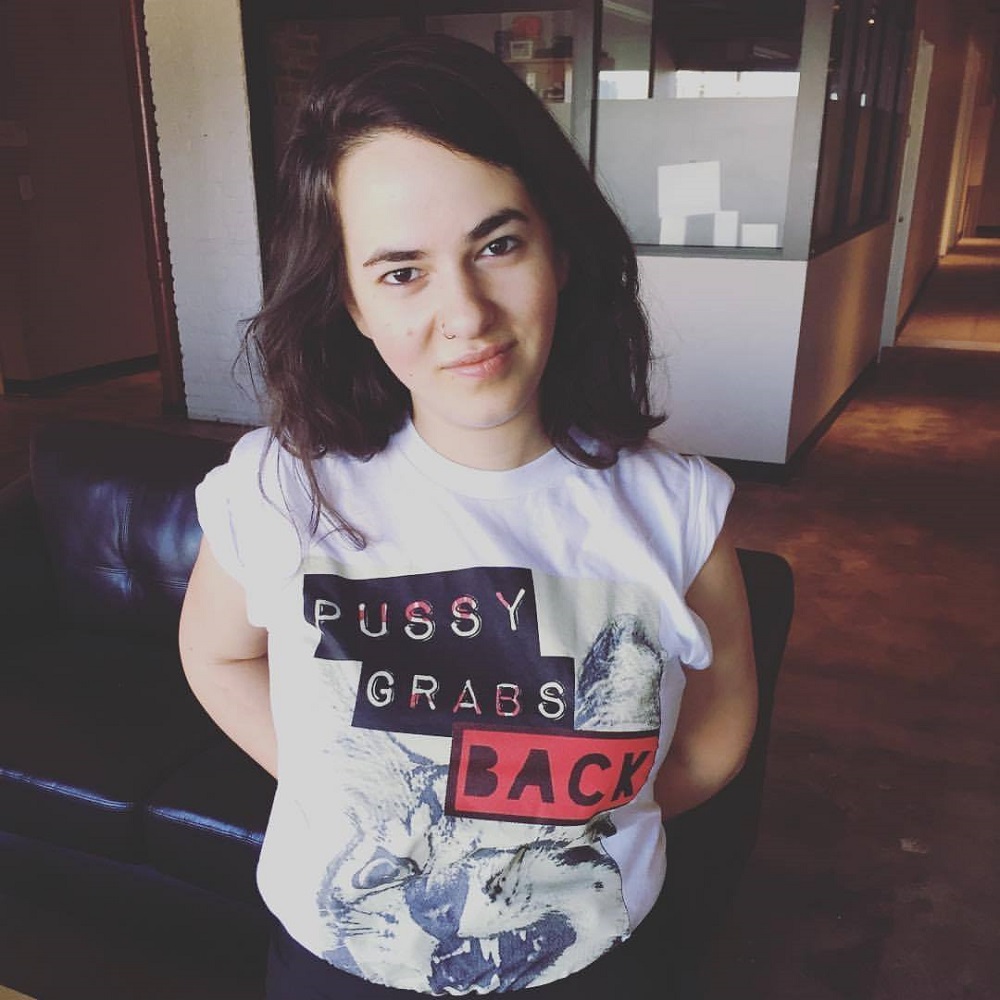IRIS BLOGGER: There's a line early on in the film where, after sharing an intimate detail about her sex life, one of the supporting characters says, "I really just want to say that." This feels like Girl Talk's mission statement, that it's an opportunity for female characters to talk about sexuality (and specifically queer sexuality) in a way that maybe hasn't been done before. Is that a fair assessment?
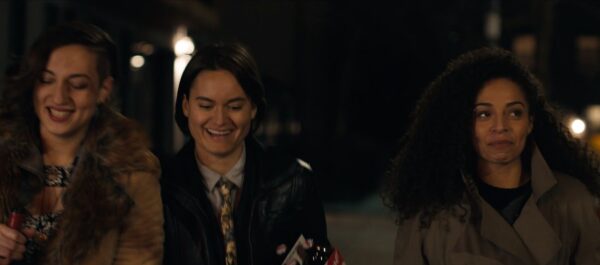 ERICA ROSE: Yes! Girl Talk is about the Brooklyn queer femme community and it’s made by the people who are part of it. It was really important to me to tell Girl Talk with as much candidness and accuracy, honesty and vulnerability as possible. I’ve seen representations of queer femme sex on camera that’s either delicate, revelatory or novel. It’s by and for male viewers. The fact is those representations simply don’t portray the complexity and diversity of how our community has sex. Like gay men or heterosexual sex, sex between two women can be messy, vulnerable, ‘dripping’ with erotic passion, silly, or just sort of boring. Writing the film didn’t feel like a radical act, rather a truthful one. Yet, through multiple screenings it’s become clear that speaking honestly about queer femme sex is both a radical and necessary act.
ERICA ROSE: Yes! Girl Talk is about the Brooklyn queer femme community and it’s made by the people who are part of it. It was really important to me to tell Girl Talk with as much candidness and accuracy, honesty and vulnerability as possible. I’ve seen representations of queer femme sex on camera that’s either delicate, revelatory or novel. It’s by and for male viewers. The fact is those representations simply don’t portray the complexity and diversity of how our community has sex. Like gay men or heterosexual sex, sex between two women can be messy, vulnerable, ‘dripping’ with erotic passion, silly, or just sort of boring. Writing the film didn’t feel like a radical act, rather a truthful one. Yet, through multiple screenings it’s become clear that speaking honestly about queer femme sex is both a radical and necessary act.
It’s important to also mention that even though Mia (played by Hannah Hodson – who is just simply amazing in this film) talks with authority when it comes to her sex life, there’s so much she’s not saying, especially to the people she really cares about. That juxtaposition is present in every scene of the film. The moment you mentioned when one of the characters says “I really just wanted to say that” (performed brilliantly by Cristina Pitter) is early in the film. Mia has just entered a party populated by the queer femme community. These are supposed to be her people, but she can’t connect to her peers because they speak in such an exposed and defenseless manner about sex, something that Mia cannot participate in because of her current state of fear. Instead of joining in the banter, she’s fixated on finding someone to hook up with that night so she can maintain the thinly veiled power she has constructed for herself. Of course as the movie progresses we see this all fall apart.
IB: This might be the most British question you'll ever have, but did you find writing about sexuality with such honesty difficult? Was it a case of having to knock back a couple of drinks first, or was it a kind of liberating explosion of creativity?
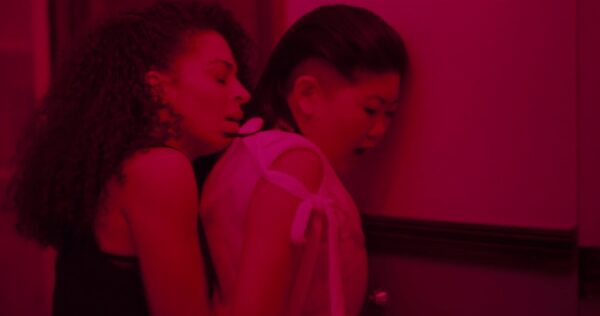 ER: That’s hilarious! Don’t worry, we’ve gotten that question in the States too! Hah! First off, can I please have permission to use that phrase liberating explosion of creativity? That’s brilliant. But to answer your question – Girl Talk is a version of my real life story, so when writing it I wasn’t necessarily conscious of writing about sexuality honestly, rather just writing about my life honestly, which frankly does involve a lot of sex. In the early drafts of the script, the story was so close to my true life experiences that it wasn’t palatable to a cohesive narrative. It was also far more graphic, which just wasn’t necessary. Chelsea Moore, my producing partner, really worked with me on the script to give the film the emotional tenor that wasn’t as prominent initially.
ER: That’s hilarious! Don’t worry, we’ve gotten that question in the States too! Hah! First off, can I please have permission to use that phrase liberating explosion of creativity? That’s brilliant. But to answer your question – Girl Talk is a version of my real life story, so when writing it I wasn’t necessarily conscious of writing about sexuality honestly, rather just writing about my life honestly, which frankly does involve a lot of sex. In the early drafts of the script, the story was so close to my true life experiences that it wasn’t palatable to a cohesive narrative. It was also far more graphic, which just wasn’t necessary. Chelsea Moore, my producing partner, really worked with me on the script to give the film the emotional tenor that wasn’t as prominent initially.
In the end, I don’t think anyone was particularly surprised that I had written Girl Talk with so much sexual liberation. As a filmmaker, all of my work deals with female sexuality and as a person I’m not afraid of sex or talking about it. I think people are far more surprised about the pervasive loneliness we see in the film. So many people have come up to us afterwards and were like “I knew it was going to be a sexy movie, but I wasn’t prepared for how sad it was going to be!” That’s exhilarating for me. I love playing with people’s expectations and pre-conceived notions and that’s evident in the film and its reaction.
IB:Did you have a particular audience in mind when you were writing Girl Talk? As a gay man, I enjoyed hearing women talk about sex, almost in an educational way. ("Oh... I'd never thought of that.") It's refreshing hearing a perspective very different to your own. Was that ever a consideration, as in, "Men... this is what we talk about." Or was the aim first and foremost to make a film about women for women?
ER: Chelsea and I had numerous conversations about our intended audience. This is a film made by queer femmes, for queer femmes. In the past couple of years, we’ve seen a rise in representation of queer female stories – Blue is the Warmest Color, Carol, The Handmaiden - yet all of those films are directed by men. I love those films for various reasons, but I was frustrated with these men telling the stores that I’m actually experiencing. Girl Talk is made from a truly queer femme perspective. It’s one thing to see a queer female relationship on camera, but it’s another thing to see that relationship written, directed, and performed by people who have those relationships.
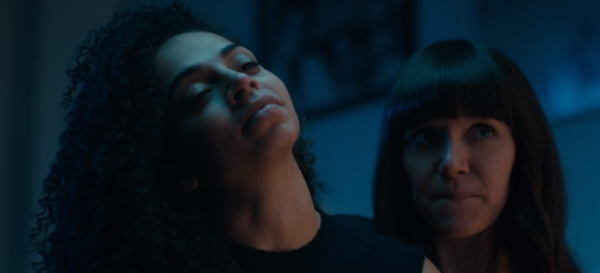 Even though the story takes place in this specific world, we believe that anyone can relate to the major themes of the film – the complexities of sex, intimacy, and rejection.
Even though the story takes place in this specific world, we believe that anyone can relate to the major themes of the film – the complexities of sex, intimacy, and rejection.
I think a lot of people in marginalized LGBT communities are frustrated with the idea of having to educate those around them. That’s completely understandable and something I’ve felt in the past too. I don’t make films to educate an audience member, but I embrace the fact that it’s an inevitable consequence of telling stories honestly, which is exciting! That’s why film is so important. It’s an opportunity to learn about people who have different experiences than yourself. So maybe an audience member can hear Mia talk about anal sex with a strap-on and think, “Oh I didn’t realize women do that with each other,” but on a more implicit level understand the myriad of dynamics that two women can express with each other sexually.
IB: You use music very effectively to highlight certain emotional beats. Was Birch's music written specifically for the film, and if so, how closely did you work with her?
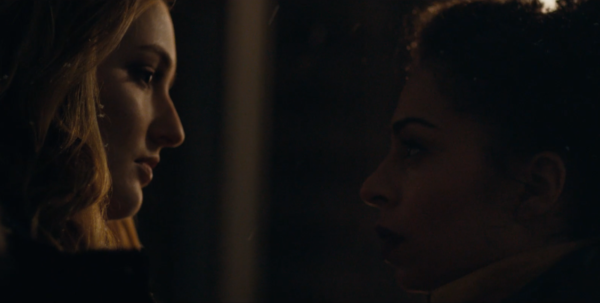 ER: I made sure to secure Birch onto the project very early in the process because I knew just how important music was going to be to this story. Birch is fantastic at balancing mood and melody effectively. I had met her a couple years ago and did a music video with her. Her music is explicitly feminist, so I knew that our collaboration would be incredibly symbiotic. The Girl Talk score is heard three times throughout the story and was written originally for the film. We went back and forth on references and arrived at a melody pretty quickly. We also worked together on the placement of the score and how each placement within the film influences the mood of the track. When we first hear the score it’s wrapped up in Mia’s fantasy. The second time we hear it we are disrupting Mia’s fantasy with blunt reality. The third time we hear the score we are at the end of Mia’s story and are met with a new day, a possible new beginning. In addition, we used some of Birch's unreleased songs for the party scenes and then licensed some other great music by other up-and-coming queer and POC musicians; Lowhency Pierre, Sally Fowler and Danielle Grubb. If anyone hear wants to check out more of Birch's work, please go to her Soundcloud.
ER: I made sure to secure Birch onto the project very early in the process because I knew just how important music was going to be to this story. Birch is fantastic at balancing mood and melody effectively. I had met her a couple years ago and did a music video with her. Her music is explicitly feminist, so I knew that our collaboration would be incredibly symbiotic. The Girl Talk score is heard three times throughout the story and was written originally for the film. We went back and forth on references and arrived at a melody pretty quickly. We also worked together on the placement of the score and how each placement within the film influences the mood of the track. When we first hear the score it’s wrapped up in Mia’s fantasy. The second time we hear it we are disrupting Mia’s fantasy with blunt reality. The third time we hear the score we are at the end of Mia’s story and are met with a new day, a possible new beginning. In addition, we used some of Birch's unreleased songs for the party scenes and then licensed some other great music by other up-and-coming queer and POC musicians; Lowhency Pierre, Sally Fowler and Danielle Grubb. If anyone hear wants to check out more of Birch's work, please go to her Soundcloud.
IB: The film is perfectly self-contained, but Mia's story feels like it has the potential to go on. Would you ever consider adapting Girl Talk into a feature, or do you think you've said all there is to say?
Chelsea and I are currently adapting Girl Talk into an episodic anthology series called Femme. In the vein of Easy or Black Mirror, Femme is an anthology of stories centered and revolving around queer &femme sexuality in Brooklyn, NY. Femme will serve as the first episode.
Chelsea and I are co-founders of the production company Sour Peach Films. In addition to Girl Talk and Femme we are finishing a feature documentary about a queer burlesque / drag collective in Brooklyn and also starting development on a narrative feature.
You can follow Erica and Sourpeach Films on both Instagram and Twitter.